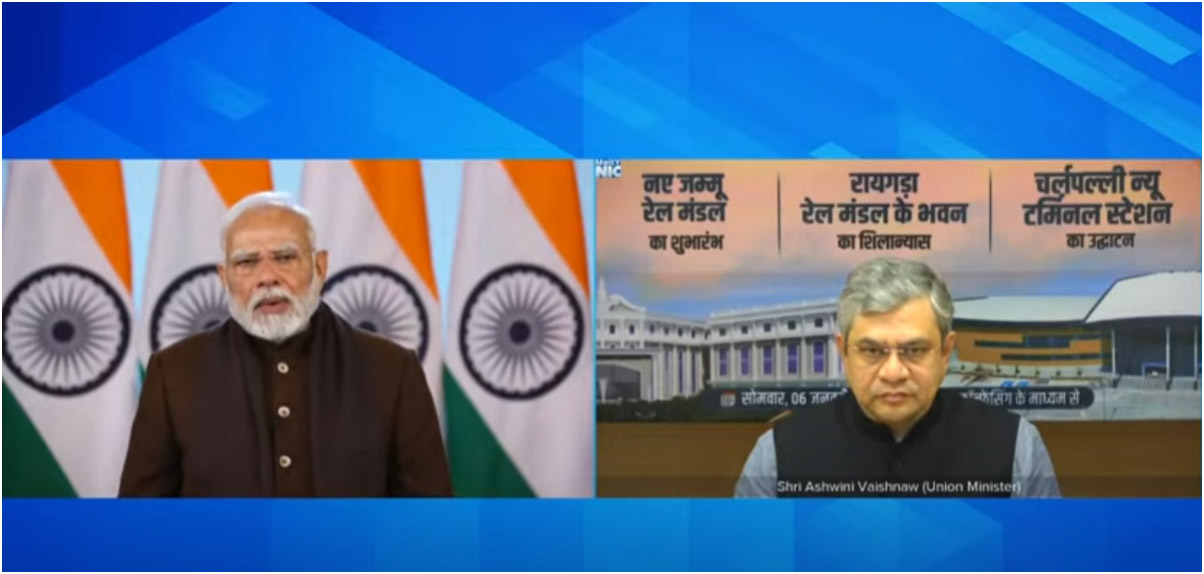Jammu, Jan 6: On Monday, Prime Minister Narendra Modi officially inaugurated the new Jammu Railway Division through a virtual ceremony, marking a significant milestone in enhancing the connectivity and infrastructure of Jammu and Kashmir.
During the address, as reported by Kashmir News Observer (KNO), PM Modi congratulated the residents of Jammu and Kashmir, stating, “The integration of J&K into the national railway network is an extraordinary step that will transform Indian Railways into a global leader in terms of efficiency, speed, and passenger experience.”
He referred to the Udhampur-Srinagar-Baramulla Railway Link (USBRL) project as a landmark achievement showcasing India’s engineering prowess.
Emphasizing modern engineering feats, he highlighted the Anji Khad Bridge, India’s first cable-stayed rail bridge, and the iconic arch bridge over the Chenab River—the world’s highest railway bridge—as global marvels.
The Prime Minister noted that the newly inaugurated Jammu Railway Division will not only benefit the people of Jammu and Kashmir but will also extend its advantages to neighboring regions including Himachal Pradesh, Punjab, and Ladakh.
PM Modi characterized the inauguration as a representation of India’s collective advancement under the vision of “Sabka Saath, Sabka Vikas,” adding vibrancy to the dream of a ‘Vikshit Bharat’ (Developed India).
“Achieving Vikshit Bharat necessitates the development of Indian Railways,” he emphasized, mentioning that the last decade has seen transformative changes in railway infrastructure, enhanced connectivity, and improved passenger facilities.
He pointed out that over the past ten years, more than 30,000 kilometers of new railway tracks have been laid, with nearly complete electrification compared to just 35% in 2014. He also mentioned that manual crossings on broad-gauge tracks have been entirely eliminated.
“Today marks a significant day for modern connectivity, demonstrating that the entire nation is progressing together,” remarked PM Modi.
He stressed that the establishment of new railway divisions, terminals, and modernized stations is generating unprecedented opportunities for trade, business, and employment.
“The railway development is creating millions of job opportunities. In the last decade, lakhs of youth have been employed in the railways, with initiatives like Gati Shakti University further enhancing the skills of the workforce,” he stated.
Speaking about advancements in high-speed train services, PM Modi noted that over 50 Vande Bharat trains are currently operational, enabling long-distance travel in shorter timeframes and setting a new standard for modern Indian trains.
“The time is approaching when bullet trains will be common across the country, making railway journeys unforgettable,” he added.
The Prime Minister also praised the expansion of India’s metro network, which has increased from 5 cities in 2005 to 21 cities today, encompassing over 1,000 kilometers of operational tracks.
Highlighting the significance of indigenous development, PM Modi stated, “Through the ‘Made in India’ initiative, we are modernizing railway stations and developing high-speed train corridors, ensuring India excels in connectivity and infrastructure.”
He reaffirmed the government’s pledge to make Indian Railways the backbone of a developed and self-reliant India, saying, “This initiative is more than just connectivity—it is about meeting aspirations and creating a brighter future for millions.” (KNO)


Leave a Reply